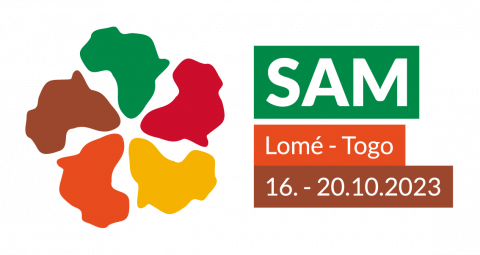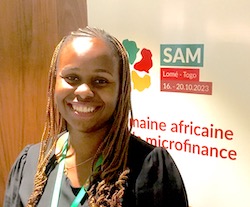 What a pleasure it was to interview Diana Chepng’eno (pictured below) at SAM 2023 in Togo last month! She is such a warm and energetic person – and deeply engaged in the critical work of climate adaptation and mitigation across Africa and the Middle East.
What a pleasure it was to interview Diana Chepng’eno (pictured below) at SAM 2023 in Togo last month! She is such a warm and energetic person – and deeply engaged in the critical work of climate adaptation and mitigation across Africa and the Middle East.
During SAM 2023, Ms Chepng’eno spoke at the opening plenary session “Making Africa’s Future Sustainable – Climate, Socio-economic Development and Inclusive Finance” as well as a breakout session titled “Helping Financial Institutions Deal with Climate Change – Assessing Risks and Strengthening Institutional Resilience.”
Bob Summers: What are you working on with the V20 group of climate-vulnerable nations (which now comprises 68 low- and middle-income countries)?
 Diana Chepng’eno: Sitting within the UN Environment Programme Finance Initiative, under the Principles for Sustainable Insurance, we are ramping up a Sustainable Insurance Facility. We launched the facility in 2022 to advocate for the importance of insurance for micro-, small and medium-sized enterprises (MSMEs) in V20 countries as a significant driver for mitigating climate change risks. MSMEs, for example, comprise about 75 percent of the total GDP of the V20. Therefore, if we can support these MSMEs by facilitating access to much-needed insurance, so that they may become more climate resilient, then these entire countries can be climate-resilient.
Diana Chepng’eno: Sitting within the UN Environment Programme Finance Initiative, under the Principles for Sustainable Insurance, we are ramping up a Sustainable Insurance Facility. We launched the facility in 2022 to advocate for the importance of insurance for micro-, small and medium-sized enterprises (MSMEs) in V20 countries as a significant driver for mitigating climate change risks. MSMEs, for example, comprise about 75 percent of the total GDP of the V20. Therefore, if we can support these MSMEs by facilitating access to much-needed insurance, so that they may become more climate resilient, then these entire countries can be climate-resilient.
BS: What mechanisms does the facility use?
DC: The work is all based on partnerships. Insurers are critical, of course. We also need firms that specialize in creating the data models on which index insurance is based. MFIs also have a critical role to play, by aggregating MSMEs to make it cost-effective to insure them.
When MFIs’ customers are insured against climate risks, that helps the customers, but it also makes the MFI more resilient. If drought strikes a region and agricultural production is greatly reduced, that doesn’t affect only farmers; all of the MSMEs along the value chain can lose a lot of money. And if they can’t repay their loans to MFIs, the MFIs can fail. SAM is a great way for us to deliver this message to MFIs – how and why to become resilient. This is important regardless of whether the MFI specializes in agricultural lending.
BS: What about carbon credits?
DC: Carbon credits can be a key piece of the puzzle. Tea farmers in Kenya, for example, are exposed to risks such as drought and hail. Meanwhile, tea trees have a long life and thus are a great tool for carbon sequestration. We can help tea farmers get the certification they need to qualify for carbon credits, and then those credits can be used to fund the insurance that protects the farmers in difficult years.
BS: How about other types of trees?
DC: It depends! Eucalyptus trees, for example, often are grown for use as utility poles, among other purposes, but they are a source of many environmental problems. People cut them down after just a few years of growth, and they are so water-intensive that they dry out nearby vegetation. Instead of eucalyptus, we encourage people to plant fruit trees. People almost never cut down fruit trees! This makes them good candidates for carbon credits, which can add to the income people make from selling the fruit. This can fund families’ day-to-day expenses as well as insurance and even pensions.
BS: What would you like to say in closing?
DC: Africans share a culture of helping their neighbors. This is something we can do at the household level, but it is also possible nation-to-nation. We can – and have the responsibility to – develop products that work in one country and then replicate them across the continent.
Diana Chepng’eno coordinates the work of the V20 Sustainable Insurance Facility in Africa and the Middle East. Her background includes serving as the Underwriting and Business Development Manager for Kenya’s Fidelity Shield Insurance Company and rolling out Kilimo Salama, an index-insurance product for farmers who tend as little as one acre.
Bob Summers has been writing and publishing news on impact investing since 2006.
This feature is the first in a sponsored series following October’s African Microfinance Week (SAM 2023). SAM is organized by ADA and the Microfinance African Institutions Network with the support of the Directorate for Development Cooperation and Humanitarian Affairs of Luxembourg and the government of the event’s host country, which rotates each time the event takes place. The next SAM is scheduled for 2025. MicroCapital has been engaged to promote SAM since 2015.
Similar Posts:
- SPECIAL REPORT: e-MFP Green Inclusive and Climate Smart Finance Action Group Focuses on Capacity Building
- MICROCAPITAL BRIEF: Cresol Baser of Brazil Borrows $12m from Huruma Fund for Farm Lending, Green Product Development, Impact Measurement
- SPECIAL REPORT: Small Is Beautiful – Sustainable Agriculture Finance
- MICROCAPITAL BRIEF: AfDB Seeking $1b for African Climate Risk Insurance Facility (ACRIFA) to Boost Microinsurance for Farms, Livestock Against Drought, Floods
- SPECIAL REPORT: Leveraging Financial Inclusion to Get Food Security Back on the Increase #EMW2023
